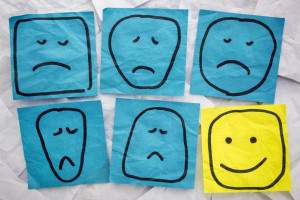
In the Disney Pixar movie Inside Out, one of the main themes is that sometimes sadness is a necessary emotion to get to joy. Similarly, a study by a CSU faculty member indicates that awareness of the value of negative emotions can limit the detrimental physical and psychological effects linked to those emotions.
In other words, embracing your bad moods may decrease the toll that they take on you.

“Like in Inside Out, there is a place and time for these emotions,” says Gloria Luong, who joined CSU’s Department of Human Development and Family Studies as an assistant professor this year. “You don’t have to feel bad about being in a bad mood.”
Luong was lead author on a paper being published by the American Psychological Association journal Emotion titled, “When Bad Moods May Not Be So Bad: Valuing Negative Affect Is Associated With Weakened Affect-Health Links.”
Previous research has linked negative emotions (also referred to as “negative affect”) to a higher prevalence of poor health outcomes and psychological states. Luong’s study, conducted as part of her post-doctoral work at the Max Planck Institute for Human Development in Berlin, involved 365 German citizens between the ages of 11 and 88. In the 2013 project, funded by the Max Planck Society for the Advancement of Science, participants were provided with smartphones that prompted them to fill out a short survey about their emotions and physical well-being six times a day. In addition to the self-reporting, researchers measured indicators of physical well-being such as subjects’ hand grip strength.
They also assessed the degree to which participants appreciated the value of negative emotions. After all, negative emotions may be appropriate in certain contexts and serve adaptive functions.

For example, fear can promote life-saving “fight or flight” responses in dangerous situations. Anger can be helpful in business negotiations, some get a thrill from scary movies, and sadness can be appropriate at funerals.
Luong’s research team found that those who saw greater value in negative emotions were less likely to suffer from the harmful physical and psychological effects that have been associated with those emotions in other studies. That is, people who more frequently recognize that negative affect can be helpful, appropriate, meaningful and not entirely unpleasant exhibited weaker links between their own experiences of negative affect and suboptimal physical and psychosocial well-being.
“The findings suggest that for some individuals and in some cases, being in a bad mood is not always a bad thing,” Luong says.
Co-authors on the paper were Cornelia Wrzus of the Johannes Gutenberg University and Gert Wagner and Michaela Riediger of the Max Planck Institute for Human Development.
The Department of Human Development and Family Studies is in the College of Health and Human Sciences.